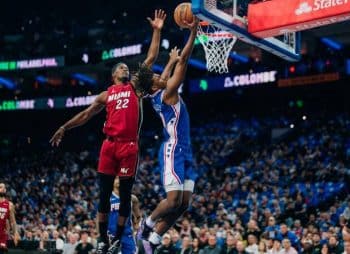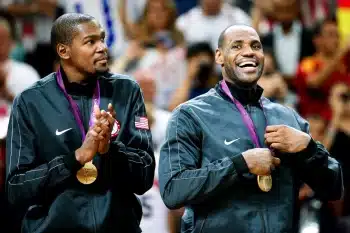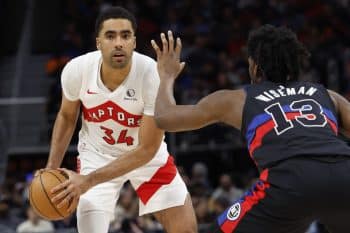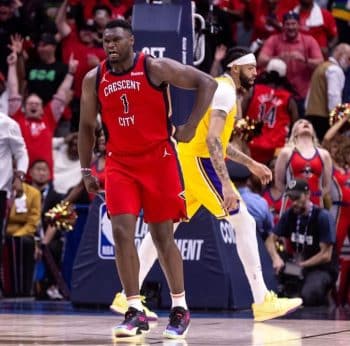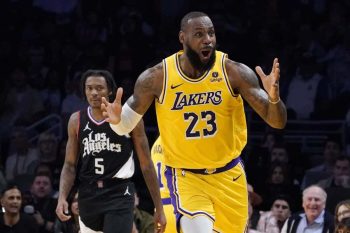NBA
NBA Sunday: Can James Harden Revert?

Just because I ranked Jimmy Butler higher than James Harden on my list of the league’s best shooting guards doesn’t mean that I don’t see Harden’s value. I just happen to think that Butler and Klay Thompson each have game-changing ability on both ends of the floor, making them worthy of higher consideration. Sue me.
Joining Harden in Houston is another individual I have been critical of: Mike D’Antoni. Whether agree with me on Harden or not, one thing we can all agree on is that Harden has the capability of being one of the best point guards in the entire league. Yes, point guard.
If things break right for Harden and D’Antoni, the Rockets could very well find themselves in the thick of the Western Conference playoff race.
* * * * * * * *
When Dwight Howard opted to leave the Southern California sun for Houston, the thought of most NBA onlookers was that he would form an impressive one-two punch with Harden and that the duo would help the Rockets contend for many years to come. In his three years there, Howard helped the Rockets win 54, 56 and 41 games, respectively. However, the truth is, the team was only special because of the offensive talents of Harden. One of the most unstoppable on-ball weapons in the league, Harden rose to prominence and entered the MVP conversation after the world realized that he was an outstanding offensive force cut from the same mold of Allen Iverson. What was especially impressive was the Rockets being able to win 56 games during the 2014-15 season despite only having Howard for 41 of them.
Rightfully so, Harden’s impressive output (27.4 points, 5.7 rebounds, seven assists and 1.9 steals averaged in 81 games played) resulted in him finishing second to Stephen Curry in the MVP race. Most of the informed masses who have been critical of Harden have never questioned his talents or the gifts that he brings to the offensive end of the court. The only argument that one could make against him is his woeful defensive output.
In much the same way Iverson did, Harden has become the alpha and the omega of all offensive things that the Rockets have done since they acquired him in October of 2012.
Believe it or not, part of what made Harden the apple of Daryl Morey’s eye was the fact that he was the embodiment of a “team-first” player. In Oklahoma City, there were no indications that Harden resented the fact that he was playing third fiddle behind Russell Westbrook and Kevin Durant. Harden and his representatives only had one sticking point. They were fine with being third fiddle, so long as Harden was paid like a lead singer. During the time of the impasse, which led to Harden’s being trading, a source in the Oklahoma City front office told Basketball Insiders that the entire conflict was financially driven, and it’s easy to understand why. For a thrifty franchise, paying a bench player a maximum-salaried contract didn’t seem prudent at the time. Today, obviously, we all know differently.

That’s James Harden in a nutshell.
As a member of the Thunder, Harden provided tremendous value to Scott Brooks by being a combo guard off the bench. Harden was able to score, yes, but his bigger and better contribution to the team was serving as a floor general. He shared the floor with Westbrook in many instances and allowed the explosive guard the opportunity to play off the ball and pursue his own scoring opportunities more aggressively. It seems so long ago that many questioned whether or not Westbrook should be a full-time point guard at the NBA level. It’s so long ago that nobody seems to remember that Harden’s proficiency at playing the position made Brooks battle with that very quandary for a short while in Oklahoma City.
The other forgotten part about Harden’s contributions in Oklahoma City were that he was actually a capable on-ball defender and could effectively guard both guard positions. He wasn’t necessarily in the conversation for Defensive Player of the Year, but he wasn’t a turnstile and his defensive effort didn’t come close to the embarrassingly awful level it has been in recent years with the Rockets.
In short, from the outside looking in, it appears that once Harden relocated to Houston, he morphed as a player. Perhaps out of necessity (just like Ewing), he became more shot happy and fell in love with playing on one side of the court. In his very first game for the franchise, Harden gave the world an omen of what was to come, scoring 37 points and dishing out 12 assists in a win over the Detroit Pistons.
It’s safe to say, however, that from that day, he began changing into a different player. In many ways, he has become this generation’s version of Allen Iverson. Iverson was a ball-dominant guard who was largely regarded as a volume scorer. Some of his teammates—mainly those who were content with doing the “dirty work”—enjoyed playing with him. Others didn’t. Iverson was at his best when he was flanked by four other players who could cover up for his shortcomings and find ways to be effective without having plays drawn for them.
Today, because of his wizardry on the basketball, Stephen Curry has drawn comparisons to Allen Iverson, as well, but the major difference between the two is that Curry is content with playing off the basketball and is similarly content with blending in on the offensive end. The same can’t be said of Harden.
What’s most interesting in the entire ordeal is that the Rockets achieved the most success when Howard played the least. During the 2014-15 season, with Howard appearing in only 41 games, Terrence Jones, Donatas Motiejunas and Josh Smith seemed to pick up the majority of minutes available due to Howard’s absence. Harden didn’t have to defer to them or ensure that they got touches in order to remain engaged. This was one of the central conflicts as it related to the deterioration of his relationship with Howard.
Clearly, Harden has become a truly great offensive force since becoming a member of the Rockets. Now, with the arrival Mike D’Antoni, the challenge will be to ask Harden to revert, at least partially, to the team-first ball distributing scoring guard that he once was with the Thunder.
* * * * * * * *
After their first three preseason contests, the Rockets predictably showed the strength of an offensive juggernaut. The team averaged 128 points per game with Harden leading the way. Despite occurring in limited minutes, his 23.3 points per game wasn’t much of a surprise. Being the primary ball distributor, though, Harden managed 12 assists per game.
With D’Antoni having had success installing high-octane offenses and most notably with Steve Nash, we are likely to see Harden morph again. Without question, competing in the Western Conference is no walk in the park. And in many ways, expecting the Rockets to come close to being the team they were during the 2014-15 season (mostly without Howard) may be crazy.
But with Mike D’Antoni and James Harden joining forces and with the lefty being installed as the team’s point guard, we can say that the marriage is so crazy that it just might work.
